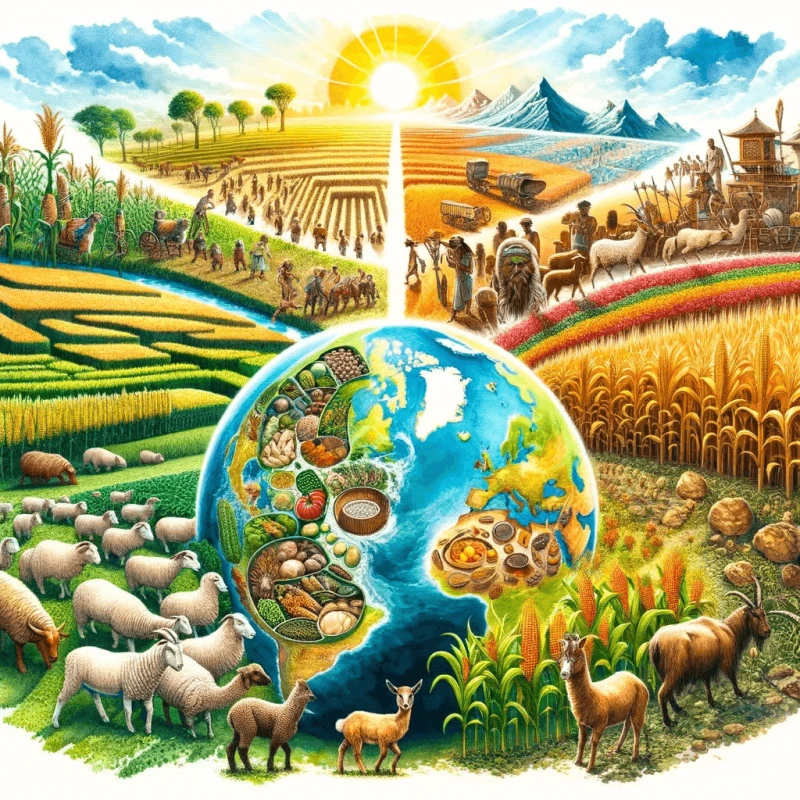Global farming revolution since the 1960s: ‘A miracle of science, technology, innovation, and entrepreneurship
Global farming revolution since the 1960s: ‘A miracle of science, technology, innovation, and entrepreneurship
Barry Goodwin, Vincent Smith | American Enterprise Institute (AEI) | January 9, 2025
XLinkedInFacebookRedditBlueskyThreads


- The global production of six major food and animal feed crops (corn, wheat, rice, soybeans, cassava, and millet) has dramatically increased and far outpaced world population growth between 1961 and 2022 due to advances in agricultural research, innovation, and entrepreneurship.
- Public and private investments in agricultural research and development have been instrumental in driving substantial productivity and yield increases through technologies such as hybridization, genetic modification, and precision agriculture.
Follow the latest news and policy debates on sustainable agriculture, biomedicine, and other ‘disruptive’ innovations. Subscribe to our newsletter.
- However, ill-advised government policies may severely limit the capacity of scientists, entrepreneurs, and farmers to sustain and increase current levels of agricultural productivity and output.
- Such ill-advised policies include restrictions on developing and using genetically modified crops; mandatory organic production targets, such as those proposed by the European Union; and substantial reductions in public funding for agricultural research and development in many high-income countries, including the United States.
Read the full pdf
This is an excerpt. Read the original post here
XLinkedInFacebookRedditBlueskyThreads

 | Videos | More... |

Video: Nuclear energy will destroy us? Global warming is an existential threat? Chemicals are massacring bees? Donate to the Green Industrial Complex!
 | Bees & Pollinators | More... |

GLP podcast: Science journalism is a mess. Here’s how to fix it

Mosquito massacre: Can we safely tackle malaria with a CRISPR gene drive?

Are we facing an ‘Insect Apocalypse’ caused by ‘intensive, industrial’ farming and agricultural chemicals? The media say yes; Science says ‘no’
 | Infographics | More... |

Infographic: Global regulatory and health research agencies on whether glyphosate causes cancer
Does glyphosate—the world's most heavily-used herbicide—pose serious harm to humans? Is it carcinogenic? Those issues are of both legal and ...
 | GMO FAQs | More... |

Why is there controversy over GMO foods but not GMO drugs?
Genetic Literacy Project

How are GMOs labeled around the world?
Genetic Literacy Project

How does genetic engineering differ from conventional breeding?
Genetic Literacy Project
 | GLP Profiles | More... |

Alex Jones: Right-wing conspiracy theorist stokes fear of GMOs, pesticides to sell ‘health supplements’




 Viewpoint — Fact checking MAHA mythmakers: How wellness influencers and RFK, Jr. undermine American science and health
Viewpoint — Fact checking MAHA mythmakers: How wellness influencers and RFK, Jr. undermine American science and health Viewpoint: Video — Big Solar is gobbling up productive agricultural land and hurting farmers yet providing little energy or sustainabilty gains
Viewpoint: Video — Big Solar is gobbling up productive agricultural land and hurting farmers yet providing little energy or sustainabilty gains Fighting deforestation with CO2: Biotechnology breakthrough creates sustainable palm oil alternative for cosmetics
Fighting deforestation with CO2: Biotechnology breakthrough creates sustainable palm oil alternative for cosmetics Trust issues: What happens when therapists use ChatGPT?
Trust issues: What happens when therapists use ChatGPT? 30-year-old tomato line shows genetic resistance to devastating virus
30-year-old tomato line shows genetic resistance to devastating virus California, Washington, Oregon forge immunization alliance to safeguard vaccine access against federal undermining
California, Washington, Oregon forge immunization alliance to safeguard vaccine access against federal undermining The free-range chicken dilemma: Better for birds, but with substantial costs
The free-range chicken dilemma: Better for birds, but with substantial costs ‘You have to treat the brain first’: Rethinking chronic pain with Sanjay Gupta
‘You have to treat the brain first’: Rethinking chronic pain with Sanjay Gupta
